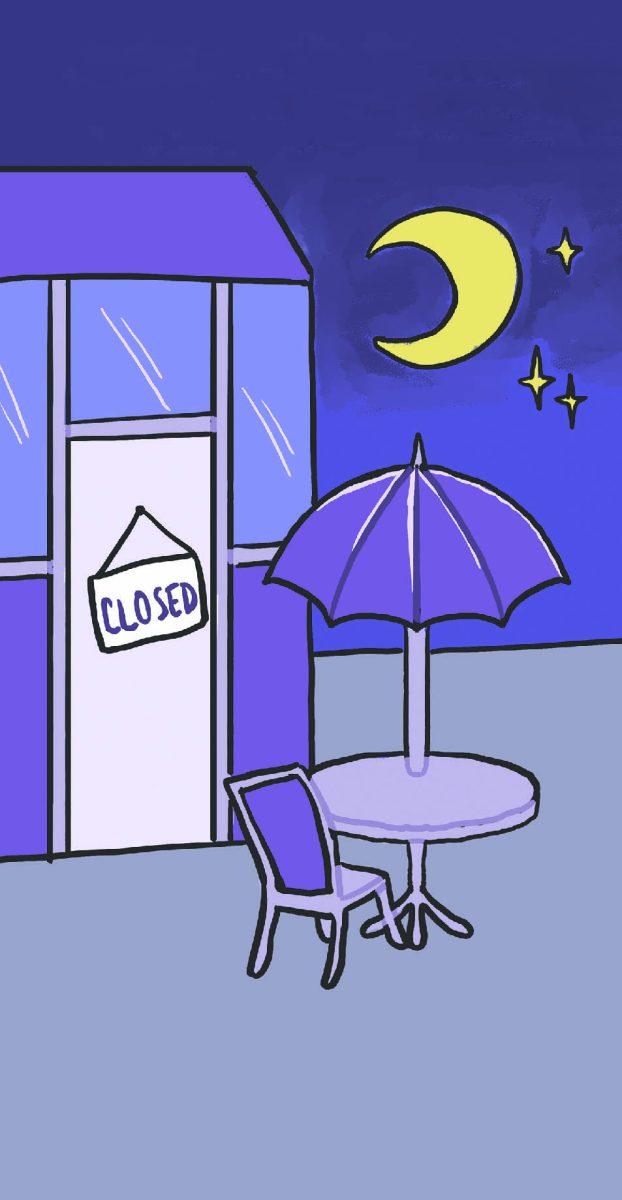
Graphic by Cecilia Romero | Mercury Staff
Campus nightlife can be improved by longer restaurant hours
A couple of weeks ago, I was dropped back to my dorm a
little earlier in the weekend than I usually would’ve been. In an effort to
prepare myself for the week to come, I decided to take a stroll to the library
through campus. As I trudged through the cold, I couldn’t help but notice how
empty and dark campus felt.
I wasn’t used to living at UTD over the weekend — let alone
roaming around campus — and I was taken aback. Nightlife, which comprises all
the entertainment and social opportunities on campus, seems to be lacking at
UTD, and food, as well as activities surrounding food can be a potential
solution to this issue.
A survey conducted by The Princeton Review on 140,000
students at 385 colleges revealed that UTD was in the top ten universities with
unhappy students. According to an article written by The Mercury, Clinical
Direactor of the Student Counseling Center Jenna Temkin said that while the
survey was not an accurate representation of the school, the sentiment could be
attributed to disconnection. UTD, a school in which 75% of students commute, is
a playground for disconnection.
The Student Union is a hub of campus activity: the SU is
bustling with people waiting in line to eat, walls lined with posters to
advertise various clubs and meetings and filled with people casually hanging
around in their breaks. However, the Student Union is the only central location
of student gathering, and even that diminishes over the weekend. Considering
how much of the student body consists of commuters, the vivacious activity of
the Student Union relies on those students.
Unfortunately, for those living on campus, weekend and night
life is virtually non-existent. For a lot of commuters, college simply consists
of attending classes and the occasional club. At night, the streets of UTD are
quiet, effectively adding to the disconnection between students.
It is said that food brings people together, and the school
can work to cultivate a more active campus. By either adding cheaper options
for dining throughout campus, such as fast food or by concentrating
entertainment in popular food locations, the school can drive up not only
activity, but also revenue. Commuters — the backbone of this school — can
benefit massively from these potential solutions and influence campus interactivity.
Creating cheaper food options throughout campus will lead to
an increase in demand for food, thus allowing UTD to profit. Commuters would
have more of an incentive to stay on campus with cheaper food options, either
to study longer on campus or to hang out. Commuters, even if given the option
of going home to eat, might be inclined to pick eating at UTD restaurants if
restaurants are more flexible, available and cheaper.
Adding available food all around campus would make eating,
studying and hanging out easier. Campus food improvements can also affect the
activities provided by UTD. As more people remain on campus at later times,
more activities can be created to entertain people which can, in turn, draw
more people toward these food locations to eat. For example, an open mic night
last month hosted by SUAAB at The Pub actually caused more people to show up.
Thus, a positive feedback loop, created from the relationship between food and
activities, is formed.
Change is a two-way street. Even if the SU restaurants
decide to stay open longer and food becomes more available on campus, the
students of UTD have to show up. If students can come in for food during the
latest time that restaurants can remain open, it will show the need for
extended hours on campus. It would show that extended hours can actually be
utilized by students. SUAAB, similarly, holds various events throughout campus,
and often, clubs on campus hand out free food. If students can show that
extended hours are necessary, they can contribute to changing the dynamic on
campus.